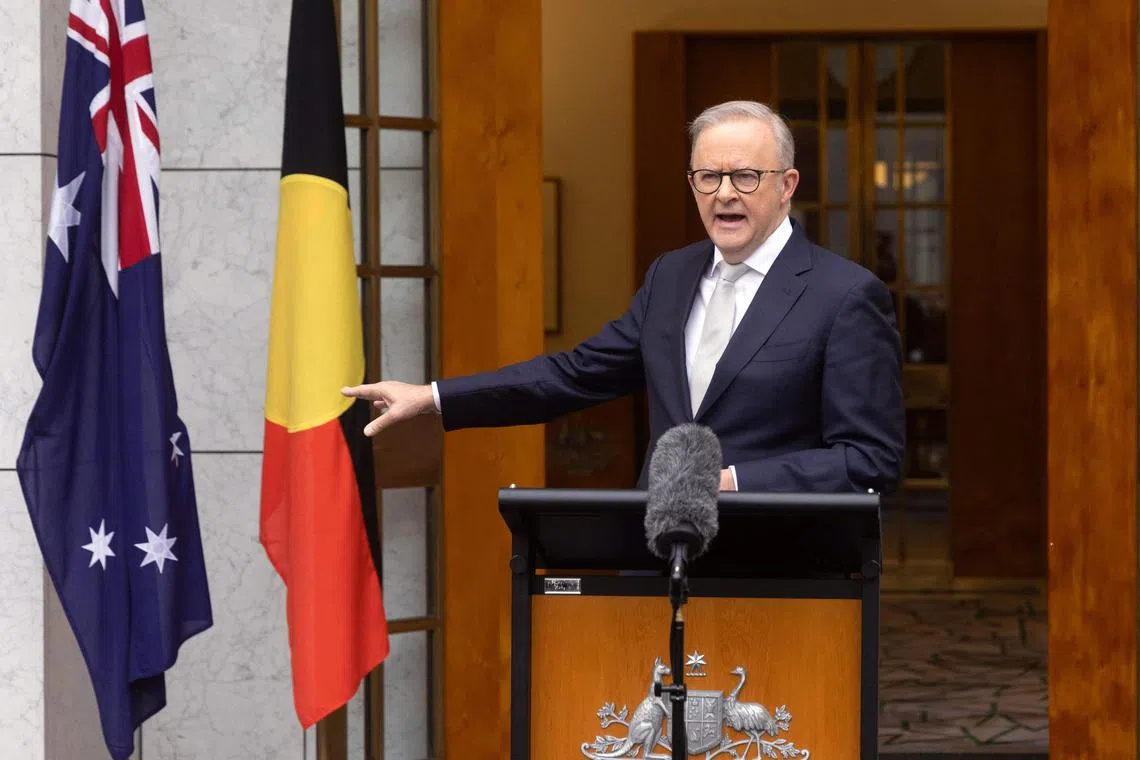Australian PM calls election for May 3 as polls signal tight race amid living cost concerns
Sign up now: Get insights on Asia's fast-moving developments

Australian Prime Minister Anthony Albanese speaking at Parliament House in Canberra on March 28.
PHOTO: AFP
Follow topic:
SYDNEY – Australian Prime Minister Anthony Albanese called an election for May 3, hoping to win voters over with his pledge of steady leadership in the face of global uncertainty and promises to tackle the high cost of living.
Opinion polls put him neck and neck with opposition leader Peter Dutton, a hardliner on security and migration.
Mr Albanese, 62, who led Labor back to power at the last election in 2022, painted Mr Dutton, who leads the Liberal-National Coalition, as a “risk” who would cut healthcare, social services and public service jobs at a time when households are struggling.
“The world today is an uncertain place, but I am absolutely certain of this: Now is not the time for cutting and wrecking, for aiming low, punching down or looking back,” he told reporters on March 28 after announcing the election date.
Mr Dutton, 54, a former police officer who became an MP in 2001 and has served as minister for defence, home affairs and immigration, has accused Labor of “wasteful spending” that has worsened cost-of-living pressures and added to housing unaffordability.
A hardliner on border security who has sometimes been compared to US President Donald Trump – a comparison he has dismissed – Mr Dutton said Mr Albanese lacked the fortitude to deal with “our times, which are very uncertain”.
“Unfortunately, Mr Albanese is too weak, and Labor is too incompetent, to fix the problems that they’ve created and that are facing our country today,” he told reporters.
The election is expected to focus on cost-of-living concerns following a spike in inflation and interest rates due to the Covid-19 pandemic, global supply chain problems and the war in Ukraine.
But inflation has now dropped from a high of 7.8 per cent in December 2022 to the current rate of 2.4 per cent, and interest rates were cut in February after a run of rises that began in May 2022.
The easing economic conditions have helped Mr Albanese to improve his position in recent opinion polls.
The latest polling averages compiled by The Poll Bludger website showed Labor and the Coalition were expected to win 50 per cent each, though the election outcome will depend on how these votes are spread across electorates.
Mr Albanese’s left-of-centre Labor won 77 of the then 151 seats in the Lower House of Parliament at the 2022 election, compared with 58 for the Coalition, 10 for independents, and six for the Greens and others.
Most pollsters believe Labor will win the election but lose its ruling majority, which will force it to rely on the support of independent and Greens MPs.
Polling expert Kos Samaras, a director at Redbridge Group, said Labor and the Coalition will both struggle to win votes amid concerns that neither is properly addressing cost-of-living pressures or rising inequality.
“There’s a perception within a growing group of Australians that the two major parties don’t have the answers to the deep problems they are facing,” he told The Straits Times.
Mr Dutton has proven to be a wily opposition leader who has staked out hardline positions in divisive areas such as immigration and energy, while largely avoiding confronting Labor in areas where it is popular, such as healthcare and welfare.
Though no first-term government has lost an election since the 1930s, polls indicate Mr Dutton is currently a genuine prospect for winning. The most recent Newspoll survey on March 9 found 47 per cent believe Mr Albanese would be a better prime minister while 38 per cent favoured Mr Dutton, with 15 per cent undecided.
Mr Dutton has flagged plans to cut annual permanent migration levels of 185,000 people a year by 45,000, amid concerns that the current levels are contributing to high rents and property prices.
A critic of Labor’s climate change ambitions, his signature policy is a plan to build seven nuclear reactors, with the first to come online by 2035 to 2037.
The A$331 billion (S$280 billion) taxpayer-funded plan has been widely condemned by scientists and Labor. There are concerns it will be unaffordable, slow to build, risk prolonging the use of ageing coal-fired power stations, and curb investment in renewable energy.
Mr Albanese, in contrast, is promising all Australians a tax cut of A$5 a week from 2026 and stronger climate action, including having 82 per cent of electricity powered by renewables by 2030, up from 46 per cent in the fourth quarter of 2024.
On foreign policy, Mr Albanese has largely followed the policies of the previous Coalition government, including the plan to acquire nuclear-powered submarines as part of the Aukus pact with the US and the United Kingdom.
But his warmer rhetoric towards China has helped to stabilise ties and persuade Australia’s largest trading partner to end its economic sanctions on about A$20 billion worth of Australian goods.
Mr Albanese has sought to avoid open disputes with Mr Trump. The US is Australia’s closest ally. But Mr Albanese did not support the White House’s suspension of aid for Ukraine.
Mr Dutton, too, opposed Mr Trump’s stance on Ukraine, but otherwise signalled unwavering backing for the US.
Whereas Australian leaders in recent times have tended to make their first bilateral foreign trip to Indonesia, Mr Dutton said he will go to Washington. He said he would try to find “common ground” with Mr Trump, and has criticised Mr Albanese for failing to do more to persuade the White House to grant Australia an exemption from tariffs.
Mr Dutton’s tone towards China – and that of some senior Coalition MPs – has tended to be harsher than Mr Albanese’s. As defence minister in 2022, Mr Dutton signalled that Australia would back the US in a war with China over Taiwan. But he has since described himself as “pro-China” and signalled that he wants to pursue closer commercial ties.
Mr Samaras said efforts to compare Mr Dutton to Mr Trump are misguided, noting that the US President is “extremely unpopular” in Australia.
“I don’t think there is an armada of Australians looking for a Trump-like personality,” he said.
Australia is one of the few countries where voting is compulsory. This tends to encourage political leaders to appeal to the centre rather than form voting blocs at the fringes.
So, the coming five-week campaign will likely see Mr Dutton try to restrain some of his hardline instincts and Mr Albanese paint himself as a steady, risk-free choice at a time of global uncertainty.


